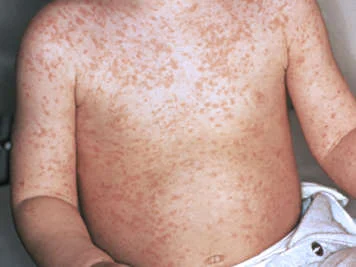Follow us and share.
Everything you need to know about measles prevention: tips and recommendations
Measles, one of the most contagious viral diseases, remains a threat in many parts of the world despite the availability of safe and effective vaccines. Although it has been virtually eradicated in some countries, outbreaks can re-emerge if immunization is not kept up to date. In this article, we'll explore the essentials of measles prevention, from the importance of vaccination to protective measures you can take to prevent the spread of this disease.

Understanding how to prevent measles is critical not only to protect your health, but also to contribute to the safety of the community at large, especially those most vulnerable, such as infants and people with weakened immune systems. Below, we offer key tips and recommendations to stay informed and protected.
What is measles?
He measles Measles is a highly contagious viral disease that primarily affects children, although unvaccinated adults are also at risk. It is caused by the measles virus, which is spread through contact with infected respiratory droplets when an infected person coughs or sneezes. Despite being a preventable disease, measles can cause serious complications, such as pneumonia, encephalitis (brain swelling), and even death, especially in people with weakened immune systems or young children.
Symptoms of measles
Measles symptoms usually appear 10 to 14 days after exposure to the virus and generally include:
- High fever
- Hacking cough
- Runny nose
- Red and irritated eyes (conjunctivitis)
- Small white spots inside the mouth (Koplik spots)
- Skin rash, which begins on the face and spreads down to the rest of the body
It's important to note that a person infected with measles can be contagious for several days before the rash appears, making it easier to unknowingly spread the virus.
How do you prevent measles?
Measles prevention is effective if appropriate measures are taken, and vaccination is the most powerful tool for controlling and eradicating the disease.
1. MMR vaccine
The MMR vaccine (measles, mumps, and rubella) is the most effective way to prevent measles. This vaccine protects against three viral diseases and is recommended for all children 12 months and older. The vaccination schedule usually includes two doses:
- First dose: Between 12 and 15 months of age.
- Second dose: Between 4 and 6 years old.
In some cases, adults who have not been vaccinated or have not had measles should receive at least one dose of the vaccine. Additionally, during outbreaks or high-risk situations, vaccination may be recommended for children under one year of age or for unvaccinated adults.

2. Herd immunity
The herd immunity It is crucial to prevent measles at the community level. This occurs when a high percentage of the population is vaccinated, which reduces the possibility of the virus spreading and protects people who cannot be vaccinated, such as infants under one year of age and immunocompromised individuals. It is essential that at least 95% of the population is vaccinated to prevent measles outbreaks.
3. Travel and measles
If you plan to travel to areas where measles is more common or where there are active outbreaks, make sure you are fully vaccinated. Measles outbreaks are more frequent in some regions, so it's essential to review vaccination recommendations before traveling.
If you are traveling with children under one year of age, consult your doctor, as in some situations an early dose of the MMR vaccine may be administered, followed by regular doses according to the vaccination schedule.
Additional recommendations to prevent measles
In addition to vaccination, there are other steps you can take to prevent the spread of measles, especially during outbreaks:
1. Isolation in case of contagion
If you or a family member has measles symptoms or has been diagnosed with the disease, it is essential to self-isolate to avoid spreading the virus to others. Avoiding public places and contact with vulnerable people is key to containing the outbreak.
2. Respiratory hygiene
Promote frequent handwashing and cover your mouth and nose when coughing or sneezing with a tissue or your elbow. These measures help reduce the spread of respiratory illnesses, including measles.
3. Outbreak control
In the event of a measles outbreak in your community, public health authorities may issue additional recommendations, such as mass vaccination of unimmunized individuals or awareness campaigns. Stay informed about local guidelines and follow the recommended guidelines.
Measles treatment
There is no specific antiviral treatment for measles. Treatment is generally aimed at relieving symptoms and preventing complications. Some recommendations include:
- Repose: It is essential that the infected person rests adequately.
- HydrationStaying well hydrated helps prevent complications, especially in children.
- Vitamin AIn some cases, vitamin A is recommended, especially in young children, as it can reduce the severity of measles.
- AntipyreticsMedications such as paracetamol can help reduce fever and relieve general discomfort, but should always be recommended by a doctor.
Conclusion: Vaccination is the key to measles prevention.
Measles, although a serious disease, is completely preventable through vaccination. The MMR vaccine is safe, effective, and essential for protecting individuals and the community at large. Be sure to stay up-to-date with your vaccination schedule and take extra precautions if you travel or if there is an outbreak in your area.
Preventing measles not only protects your health, but also contributes to eradicating this disease worldwide. Let's continue working together to keep our communities measles-free.



